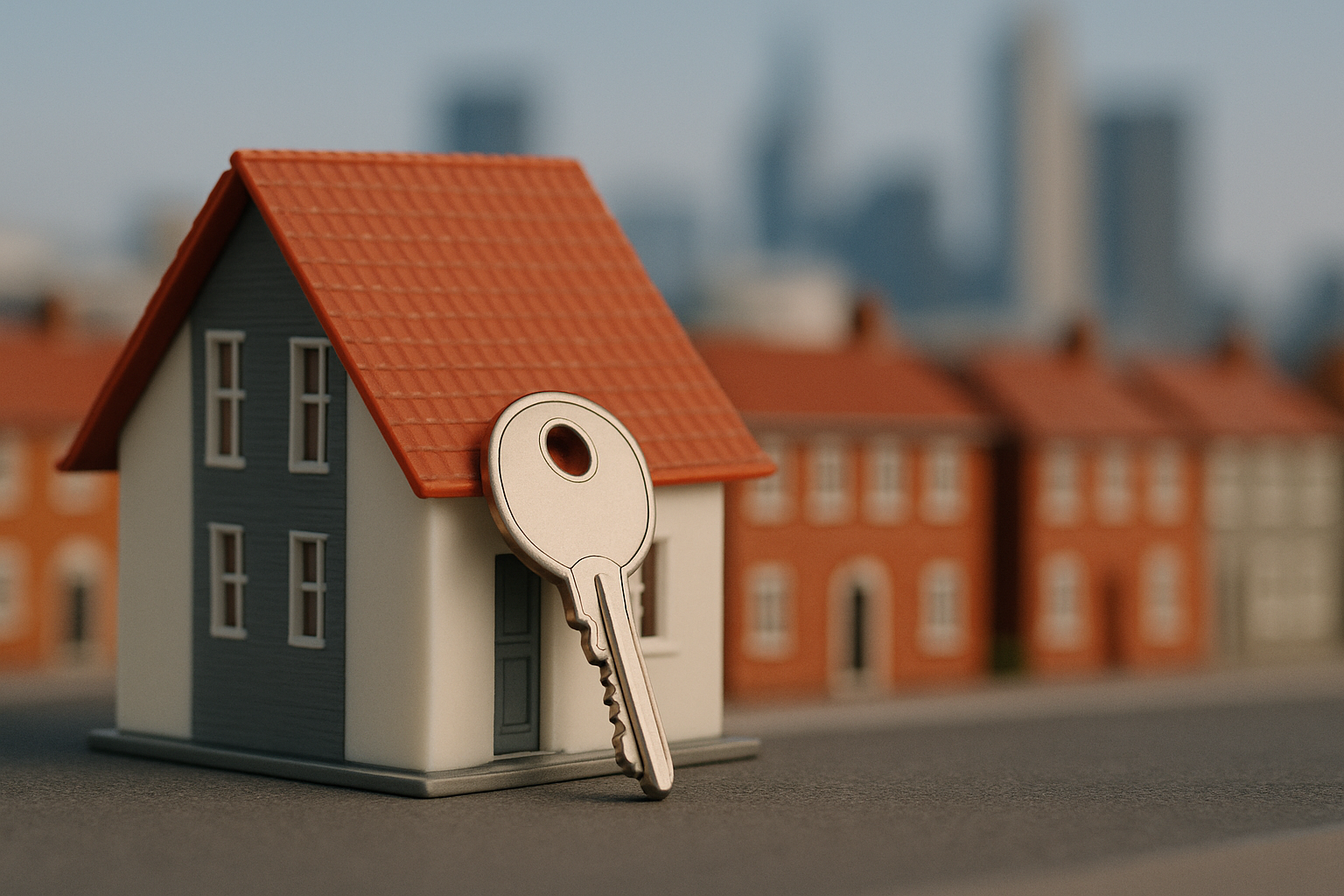Buy To Let Secured Loan on Property
Learn about secured loans for buy-to-let investors. Unlock equity to fund rental property purchases or improvements.

Related articles
Building on What You Own
A secured loan is a type of borrowing where you use a property or another valuable asset as security for the loan, making it a debt secured against your property. For landlords, secured loans on buy to let properties can be a powerful way to access extra funds—whether you’re looking to renovate an existing property, raise a deposit for a new property, or consolidate existing borrowing into a single, manageable repayment. Because the loan is secured against your property, lenders are often willing to offer larger amounts, lower interest rates, and more flexible repayment terms than with unsecured loans.
his can make secured loans a more cost-effective option for landlords compared to unsecured loans, especially when dealing with larger sums or longer repayment periods. However, it’s crucial to remember that if you fail to keep up with repayments, the property used as security could be repossessed. As with any borrowing, it’s important to weigh the benefits against the risks and ensure you only borrow what you can comfortably repay.
Can I Get a Secured Loan on a Buy-to-Let Property?
This is one of the most common questions landlords ask. The short answer is: yes, it’s possible to obtain a buy to let secured loan , but it depends on your circumstances.
Most lenders will consider a secured loan on a buy-to-let property if:
- You already own the property and have enough equity.
- Rental income is steady enough to cover repayments.
- The property meets standard criteria (habitable, insured, and not unusual in structure).
Buy to let mortgages have their own eligibility criteria, but buy to let secured loans can be easier to qualify for, even if you have poor credit or enough equity.
Unlike standard personal loans, these are secured against your property, so lenders have more confidence even if your personal credit record isn’t perfect. Credit issues may impact your eligibility, but secured loans can still be an option if you do not qualify for unsecured borrowing. That’s why secured loans for buy-to-let can sometimes be available to borrowers who might struggle with an unsecured loan, especially with certain property types .
Using an Existing Mortgage
If you already have an existing mortgage on your buy to let property, you may be able to unlock additional funds by securing a further loan against the same property. This is often done through a second charge mortgage, which is a type of secured loan that sits alongside your original mortgage but is arranged with a different lender. Alternatively, you might consider a further advance from your current lender. Both options allow you to access extra capital without disturbing your original mortgage deal, which can be useful in covering unexpected expenses.
However, it’s important to carefully consider the total amount you’ll owe and how the new monthly costs will fit into your budget. Working with a mortgage broker can be extremely helpful—they can guide you through the process, help you compare second charge mortgage options, and ensure you find the best deal for your circumstances as a landlord.
Why Choose a Secured Loan Instead of Remortgaging?
For landlords, remortgaging isn’t always the best move. You might be on a great fixed-rate deal you don’t want to lose. Remortgaging is not always the best way to release equity from your property; a secured loan can be a more flexible alternative to unsecured options . Or perhaps early repayment charges on your mortgage would wipe out the benefits.
With a buy-to-let mortgage secured loan, you keep your existing mortgage deal while raising extra finance alongside it. This flexibility is what makes let secured loans so popular with investors
Smart Uses for Secured Loans on Buy-to-Let Properties
- Expanding Your Portfolio
If you’ve spotted a new property and need quick access to funds for the deposit or other property purchases, a secured loan buy-to-let property can unlock the equity you already have and put it to work. An investment property can also be used as security for a buy-to-let secured loan. - Property Upgrades
Renovating kitchens, adding an extra bedroom, or modernising insulation can boost rental value. Secured loans for buy-to-let rental property let you fund these home improvements, including renovations to existing properties, without draining savings. - Debt Consolidation
Some landlords have multiple finance products—credit cards, personal loans, even business borrowing. Rolling them into a secured loan on buy-to-let property can simplify repayments and sometimes cut interest costs. - Business Growth
For portfolio landlords, releasing capital can mean moving faster on deals and expanding without waiting years for savings to build up.
Charge Mortgages and Their Impact
Charge mortgages, including second charge mortgages, can be a useful way for landlords to access additional funding, but they also come with important considerations. By taking out a charge mortgage, you’re increasing the total amount secured against your property, which can raise the risk of repossession if you’re unable to keep up with repayments.
Additionally, missing payments on a charge mortgage can negatively impact your credit history, making it harder to secure finance in the future. It’s essential to fully understand the terms and implications before proceeding. Consulting with a mortgage broker or specialist lender can help you assess your circumstances, weigh the risks, and choose the most suitable option for your needs as a landlord.
Risks to Be Aware Of
Of course, a secured loan isn’t risk-free. Since your property is the collateral, missed payments can lead to repossession. That’s why it’s important to treat this as a strategic tool, not easy money.
Keep in mind:
- Interest rates can vary: Check whether your deal is fixed or variable, and budget for possible increases.
- Early repayment charges: Some lenders charge a fee if you clear the loan sooner than planned.
- Rental income fluctuations: Factor in void periods or unexpected repairs—can you still cover the monthly repayments if income dips?
Being realistic upfront makes the loan work for you, not against you, and helps ensure you understand how the loan will be repaid.
Who Are Buy-to-Let Secured Loans For?
This type of borrowing might suit you if:
- You’re a landlord looking to grow your property portfolio.
- You want to invest in upgrades that increase rental yield.
- You’ve got equity tied up in property and need capital for another investment.
- You don’t want to disturb your current mortgage deal.
- You have a residential home that you’ve converted to a rental property and want to access funds.
- In some cases, personal income can be used to supplement rental income when applying for a buy-to-let secured loan.
It may not suit you if your rental income is already tight, if you have limited equity, or if you’re unsure about long-term repayments.
How Lenders Assess Applications
The application process for a secured loan on a buy-to-let property typically includes a property valuation by the lender as a key step to assess the property's value and risk.
When reviewing a secured loan on a buy-to-let property, lenders usually look at:
- Property value and equity: How much you own outright, as determined by the property valuation.
- Rental income: Whether it comfortably covers the new repayment.
- Your overall finances: Debts, credit history, and income stability.
- Loan-to-value ratio (LTV): A lower LTV, meaning you borrow relative to your property’s value, usually means a better rate.
Some lenders specialise in more complex cases, including self-employed landlords or those with credit challenges, and may offer a charge loan, such as a second charge loan, depending on your equity.
Example Scenario
Imagine you own a rental flat worth £250,000, with £150,000 left on the mortgage. That gives you £100,000 in equity. A lender might allow you to release a portion of that equity—say £50,000—via a secured loan buy-to-let.
You could then use those funds as a deposit on another property, carry out renovations, or consolidate debts. Your mortgage stays in place, but now you've leveraged your equity for growth.
Finding the Best Deal on a Buy To Let Mortgage
Securing the best deal on a buy to let mortgage or secured loan means looking beyond just the interest rate. Landlords should compare different lenders, considering not only the rates but also the repayment terms, fees, and flexibility offered. A mortgage broker can be extremely helpful in this process, as they have access to a wide range of products from different lenders and can help you find the most competitive rates for your situation. When applying, be prepared to provide details about your property’s value, projected rental income, and your own credit history.
Taking the time to research and compare options can help you secure a buy to let mortgage or secured loan that supports your investment goals and keeps your money and monthly costs manageable.
Early Repayment Charges and Their Implications
Early repayment charges are fees that some lenders impose if you pay off your buy to let mortgage or secured loan before the agreed term ends. These charges can be significant, so it’s important to check the terms and conditions of any loan before committing. For landlords, understanding early repayment charges is crucial—paying off a loan early might save on interest in the long run, but the upfront fees could outweigh the benefits.
A mortgage broker or specialist lender can help you understand how early repayment charges work and advise on the best strategy for managing your debt. By considering these charges alongside your monthly costs, existing debt, and long-term plans, you can make informed decisions that protect your investment and financial wellbeing.
Alternatives to Secured Loans
Before jumping in, it’s worth comparing other options:
- Remortgaging: Works if rates are low and you’re happy to switch deals.
- A bridging loan: A bridging loan is a short-term finance option, often with slightly higher costs than traditional loans. It is usually more expensive but can provide quick access to capital.
- Unsecured loans: No property risk, but smaller amounts and higher rates.
A second charge loan is another alternative, and may have slightly higher rates than a first charge mortgage.
A secured loan on a buy-to-let property sits in the middle ground—more flexible than unsecured borrowing, less disruptive than remortgaging.
Summing Up
Secured loans for buy-to-let give landlords a practical way to unlock equity in their btl property , grow a portfolio, and improve rental income without disturbing existing mortgage deals. Like any borrowing, it comes with risks, but with the right plan, it can be a smart tool for long-term financial growth.
If you’re weighing up your options, remember: your property is on the line, so only borrow what you can afford to repay. Be sure to shop around for the best deals, and compare offers from both high street lenders and specialist lenders to find the most favourable terms. For a fuller picture of how secured loans work in general, check out our secured loans overview.
Frequently Asked Questions: Secured Loans
Do I need to live in the property to get a secured loan?
No - with a buy-to-let secured loan, the property can already be let out to tenants. The key factor lenders focus on is the property's value and its income potential, not whether it's your home. This makes it a great option for landlords who want to unlock equity from a rental property or a second property without needing to live on-site themselves.

How much can I borrow with a buy-to-let secured loan?
The amount you can borrow depends on factors like the equity in your current property, your credit history, and the lender's criteria. This makes for a wide range of loan amounts. Lenders will also consider your current mortgage (if any), your ability to repay, and the potential rental income from the property. The more equity and income you can show, the more you can likely borrow.

Can I get one with bad credit?
Yes, it's possible even with a poor credit history. Some specialist lenders work with borrowers who've had financial difficulties in the past. The main factors will be the amount of equity in your property and whether your rental income can cover the repayments. You might not get the best rates, but a homeowner loan is typically easier to get than an unsecured loan.

Are there fees involved in buy-to-let loans?
Yes, there are usually several fees to be aware of when taking out a buy-to-let loan. These can include arrangement fees (charged by the lender), valuation fees (to assess the property's current market value), legal fees (for any conveyancing or title checks), and sometimes early repayment charges if you pay off the loan early. Some lenders may allow you to add these fees to the loan amount.

What happens if I miss payments?
Because the loan is secured against your property, missed payments could eventually lead to repossession. Lenders may take legal action to recover the debt, and your credit rating will likely be affected. That's why it's vital to budget carefully and ensure your rental income can cover your repayments. If you ever struggle to keep up, it's vital to contact your lender early on.


The details shown are for illustration only and may not include all lenders or products. Actual rates and terms depend on your circumstances and the lender’s assessment. Information was correct at publication but may change at any time.





